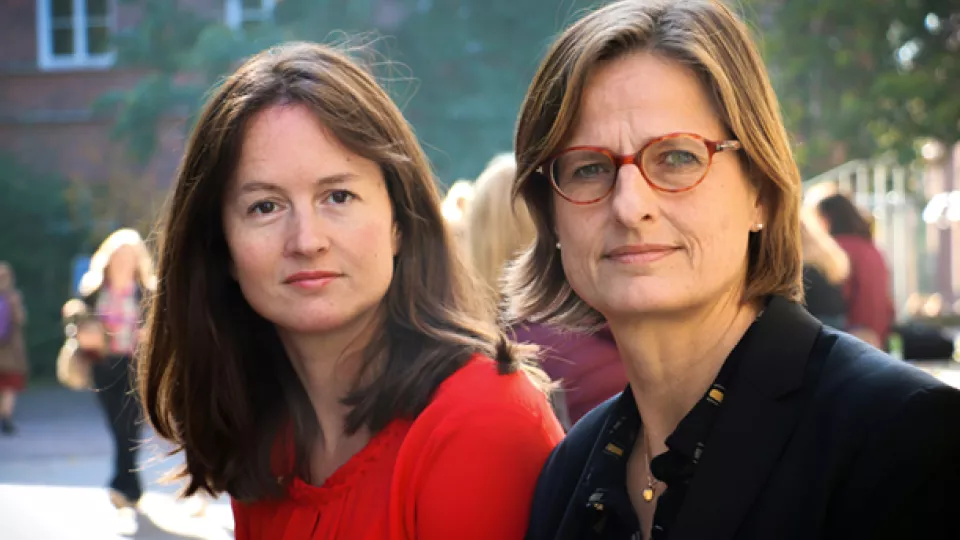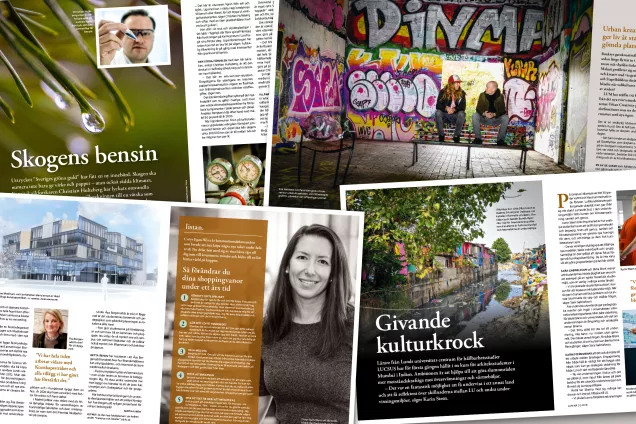The graduate school is funded from 2019 to 2023 with agency capital from the faculties. When fully developed, it will comprise approximately 20 doctoral students. One fundamental idea behind the investment is to utilise the University’s range both in education and research. In order to meet the complex challenges facing society, interdisciplinary cooperation and lines of approach are often required.
“Considering its breadth and depth, the University has unique opportunities to contribute to societal development on sustainability issues. The present investment will simultaneously highlight the University’s research and education in the field of sustainability. With the 2030 Agenda, we have the chance to strengthen interdisciplinarity and cooperation with wider society”, says Deputy Vice-Chancellor Sylvia Schwaag Serger.
The foundations of the graduate school are based on a number of interdisciplinary doctoral courses. Each faculty is given the task of developing a doctoral course of 7.5 credits which is open to the whole University and based on the issues defined in the global goals. There will be a total of 8 courses. The long-term aim is for each course to be attended by around 20 doctoral students.
What you didn’t know about Agenda 2030
It’s the planet’s attempt to achieve a sustainable future. Political scientists Kristina Jönsson and Magdalena Bexell review the policies around the 2030 Agenda and its global goals. Here, they list their observations so far.
The unique
This is the first time all the countries in the world have come together to set common goals for sustainable development across several areas: economic, social and environmental. The millennium goals and Agenda 21 previously focussed on developing countries and environment and development respectively.
“I remember actually being surprised by the fact that all of the countries in the world were able to reach an agreement on such a comprehensive agenda”, says Kristina Jönsson.
What many don’t realise
The 17 global goals are the result of political and international negotiations in the UN. Compromises are both the strength and weakness of the Agenda, according to the researchers: the goals gained political momentum due to their acceptance by all the countries in the world.
At the same time, the goals are simply the lowest common denominator. It is in this light that one should understand why a goal such as democracy is not included. As a compromise, the importance of responsibility was emphasised instead. The critically-inclined may consider the goals to be watered down, and others as supported.
Several goals challenge Sweden
Even though Sweden has put on the leader’s jersey and by several measures is ahead of the field there are challenges here too. Goal ten on reducing inequality may be hard to achieve when discrepancies are increasing.
“Goal twelve on sustainable consumption and production is also a big challenge. Not least when we consider the fact we consume many products made outside of Sweden in a non-sustainable way”, says Kristina Jönsson.
The (lack of) Swedish support
Each government produces a plan for how the goals will be achieved in their own country. The Löfven Government’s action plan for the 2030 Agenda was only produced in June 2018 and did not gain parliamentary support.
“It’s a pity. Implementation is now increasingly dependent on electoral cycles. Parliamentary support would have increased the likelihood of long-term impact. The Moderates immediately confirmed they will scrap the current action plan. And the Liberals are critical of the 2030 Agenda because it doesn’t contain a goal of democracy”, says Magdalena Bexell.
Full of goal conflicts
The 2030 Agenda lists what should be done but leaves it up to each executor - country, municipality, company or organisation – to determine how it should be achieved. Leadership at the national political level is crucial, say the researchers. And the task of managing goal conflicts lies with the politicians which can be challenging when political agendas are often significantly more short-sighted than the 2030 horizon. Another equally significant challenge relates to complexity:
“The aim of the 2030 Agenda is to encourage holistic thinking and to scrap pipeline thinking”, says Kristina Jönsson.
Different solutions
In their research, Kristina Jönsson and Magdalena Bexell have also studied how Ghana and Tanzania are adopting the 2030 Agenda.
“Developing countries often choose a few goals and concentrate on these. We have seen more discussion on the substance of goals in these countries, while political debate in Sweden until now has mainly focused on the processes surrounding the 2030 Agenda”, says Kristina Jönsson.
The difficult task of measuring
How are 193 countries to succeed in measuring and evaluating their efforts in a reliable and somewhat similar way? This question is currently generating creating lively debate in research circles and within the UN system. And Statistics Sweden is helping developing countries, via the Swedish International Development Cooperation Agency (Sida), to build up politically independent statistical institutions.
“Measurability is necessary for follow-up but it doesn’t cover all of the important aspects of sustainable development”, says Magdalena Bexell.
The effects so far
The big advantage of the 2030 Agenda, according to the researchers, is that it has contributed to the broadening of the concept of sustainability and renewed political force in national and international sustainable development policy. The researchers have observed this in the many initiatives taking place at all levels, even locally.
“The global goals are like an examination of our current reality which reveals problems we might otherwise not have discovered”, says Magdalena Bexell.



